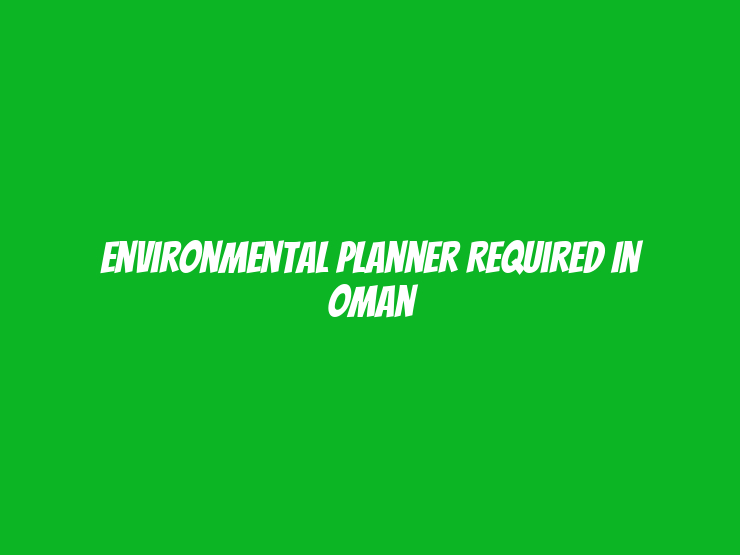An Environmental Planner is responsible for evaluating and developing plans and strategies that help ensure sustainable land use and environmental protection. Working within the fields of urban planning, environmental science, or public policy, the Environmental Planner conducts environmental assessments, drafts reports, and recommends actions to minimize the negative impact of development on natural resources. This role requires a blend of technical expertise, regulatory knowledge, and a deep understanding of environmental conservation, land-use laws, and sustainability practices.
Dua for Job Seeking: اللهم يسر ولا تعسر واكمل ولا تكل وبارك لي فيما قَدَّرت
| Salary | Market Competitive |
| Experience | 10 – 15 Years |
| Location | Oman |
| Qualification | Bachelor of Technology/Engineering(Civil) |
| Posted | 21 November 2024 |
| Job Type | Full-Time |
| Posted by | Habeebi Recruiter |
| last date to apply | apply within 15 days |
Key Responsibilities
- Environmental Impact Assessment (EIA):
The Environmental Planner leads the process of conducting Environmental Impact Assessments to determine the potential environmental effects of proposed projects or developments. They assess various environmental factors such as air quality, water resources, wildlife, and vegetation, identifying any potential risks or issues that could arise from construction or development activities. Based on their findings, they develop mitigation strategies to minimize the negative impact on the environment. - Research and Data Analysis:
A key responsibility of an Environmental Planner is to conduct thorough research and data analysis regarding environmental laws, regulations, and trends. This includes staying updated on local, state, and federal environmental policies, climate change initiatives, and sustainable development practices. The Environmental Planner uses this information to guide project planning and ensure that any environmental concerns are addressed appropriately. - Regulatory Compliance and Permitting:
The Environmental Planner ensures that all projects comply with relevant environmental laws and regulations. They assist in obtaining the necessary permits for construction or development projects, working with regulatory agencies to navigate zoning laws, environmental protection policies, and other legal requirements. They ensure that all necessary environmental protections are in place before a project can move forward. - Sustainable Planning and Design Recommendations:
Environmental Planners work closely with architects, engineers, and developers to incorporate sustainability and environmental considerations into the design and planning of projects. They recommend strategies to reduce resource consumption, increase energy efficiency, and promote the use of sustainable materials. Their goal is to ensure that development projects minimize negative impacts on the environment while enhancing the surrounding community. - Public Engagement and Stakeholder Communication:
Environmental Planners often interact with various stakeholders, including local communities, government agencies, environmental groups, and developers. They facilitate public meetings, workshops, and forums to inform the public about proposed projects and gather feedback. They also work with stakeholders to resolve any concerns about potential environmental impacts and ensure that community interests are considered in the planning process. - Report Writing and Documentation:
One of the main tasks of an Environmental Planner is to prepare detailed reports, feasibility studies, and environmental impact statements (EIS) to document findings, analyses, and recommendations. These reports are critical for informing decision-makers, stakeholders, and regulatory agencies. The Environmental Planner must ensure that their documentation is clear, accurate, and in compliance with relevant standards. - Monitoring and Environmental Management:
After a project has been approved and construction has begun, the Environmental Planner may oversee the monitoring of environmental management plans to ensure that mitigation measures are being followed. This includes assessing the ongoing environmental impact of the development, making adjustments to the plans as necessary, and ensuring that environmental standards are met throughout the project’s lifecycle.
Qualifications and Skills
Education:
- A bachelor’s degree in Environmental Science, Urban Planning, Environmental Engineering, or a related field is required.
- A Master’s degree in Environmental Planning or a similar discipline is often preferred.
Experience:
- At least 3-5 years of experience in environmental planning, land-use planning, or a related field.
- Experience conducting Environmental Impact Assessments (EIAs) and working with local, state, and federal environmental regulations is highly desirable.
- Familiarity with Geographic Information Systems (GIS) and other planning tools is beneficial.
Skills:
- Strong knowledge of environmental laws, policies, and sustainable development practices.
- Proficiency in data analysis, environmental assessment, and report writing.
- Excellent communication and presentation skills, with the ability to interact effectively with stakeholders and the public.
- Ability to manage multiple projects simultaneously and work under pressure to meet deadlines.
- Strong organizational and problem-solving skills.
- Proficiency in GIS software and other relevant planning tools.
Working Conditions
Environmental Planners typically work in office environments, conducting research, preparing reports, and interacting with clients or government agencies. However, they may also spend time in the field conducting site visits, gathering data, and assessing environmental conditions. The role may require occasional travel for project assessments or to attend meetings with stakeholders. Working hours are generally standard, but additional hours may be required to meet project deadlines or attend public hearings.
Conclusion
The Environmental Planner plays a crucial role in balancing development with environmental sustainability. Through rigorous assessments, research, and planning, they ensure that projects comply with environmental regulations and minimize negative impacts on the ecosystem. This role is ideal for individuals passionate about environmental conservation, sustainability, and urban planning. The Environmental Planner must possess both technical expertise and the ability to collaborate effectively with diverse stakeholders to promote environmentally responsible development.
How to apply:
Send your updated resume to our email or directly reach us at our phone:
Email: info@hillintl.com
Phone: 1-800-283-4088
Disclaimer:
- We list jobs submitted by employers. HabeebiRecruiter.com does not verify employers or guarantee job details.
- Be aware: legitimate jobs never require upfront payment
